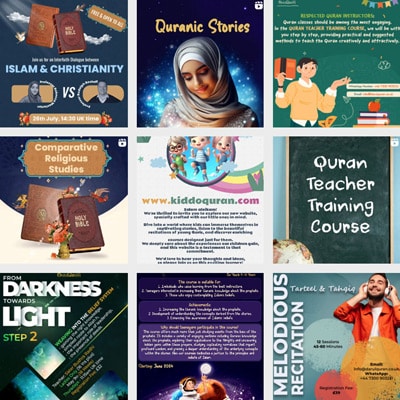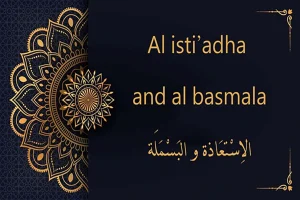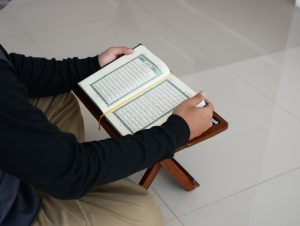Be aware, you are not concealing from God’s eye, so see how you are.
Muhammad ibn Ali al-Jawad (a)
Table of Contents
ToggleFast Quran recitation, known as “Tajwid ,” is the art of reciting the Holy Quran with proper pronunciation and fluency at an accelerated pace. It involves following specific rules for articulating each letter and reciting with clarity and beauty.
The Art of Tajwid
Phonetic Accuracy
One of the fundamental aspects of tajwid is the correct articulation of each letter and sound. It requires the recitor to pronounce each letter with precision, giving it the proper articulation and emphasis.
The Arabic language, in which the Sacred Quran was revealed, has unique sounds that are often challenging for non-native speakers. Therefore, it is crucial to learn the specific techniques and rules of pronunciation to avoid distorting the meaning of the text.
Phonetic accuracy plays a significant role in preserving the integrity of the Quranic text. Islam holds the belief that the Noble Quran is the literal word of Allah and should be recited as it was revealed to the Prophet Muhammad (S).
By adhering to the rules of tajwid, Muslims aim to respect the divine revelation and ensure that its message remains intact. A small mispronunciation can lead to misunderstanding or even changing the meaning of a verse, which is why tajwid is considered a meticulous and essential art.
Moreover, phonetic accuracy enhances the overall beauty and aesthetics of the recitation. The Heavenly Quran is often recited with a melodious and captivating style that captivates the listeners.
This style, known as maqam, requires a deep understanding of the rhythmic patterns and proper pronunciation.
By paying close attention to phonetic accuracy, the recitor can bring out the natural beauty of the words, making the recitation appealing and impactful.
Phonetic accuracy also helps in conveying the depth of the Quranic message. Each word and verse in the Grand Quran carries profound meaning and significance.
By pronouncing the words correctly, not only does the message remain intact, but the full impact of the message is also conveyed. The proper articulation and emphasis on the letters allow the listener to understand the intended emphasis, emotion, and mood of the text, enhancing the overall spiritual experience.
To achieve phonetic accuracy and excel in tajwid, extensive practice and dedication are required. Learning the correct pronunciation of each letter, understanding the rules of enunciation, and mastering the various forms of modulation and intonation must be accomplished. It is not merely about reciting the words; it is about understanding the intricacies and the depth of each verse.
Tajwid recitors spend years perfecting their craft, ensuring they deliver the Quranic message with utmost precision and beauty.
Rhythmic Recitation
Tajwid is a science that was developed by early Muslim scholars who dedicated their lives to preserving the authenticity of the Glorious Quran.
They studied the ways in which the Prophet Muhammad (peace be upon him) recited the Pure Quran and devised a system to ensure its correct recitation .
This system involves rules and principles that guide a reciter on how to pronounce each letter and word with precision and clarity.
One of the key aspects of tajwid is the proper articulation of the letters.
Every letter in the Arabic alphabet has its own unique characteristics, known as its makhraj, which refers to the point of articulation. For example, the letter “ba” is articulated by bringing both lips together, while the letter “tha” requires the tip of the tongue to touch the upper front teeth.
Reciters of the Holy Quran learn these makharij to ensure that each letter is pronounced correctly, as even a slight deviation can alter the meaning of a word.
Another fundamental aspect of tajwid is the application of the rules of nunation, or tanwin.
These rules dictate the way in which certain letters are pronounced when they are followed by a specific sound. For example, the letter “noon” with a fatha (a short “a” sound) is pronounced as an “n,” but with a kasra (a short “i” sound), it is pronounced as “ni.”
The application of these rules adds a rhythmic and melodic element to the recitation, enhancing its beauty and eloquence.
Moreover, tajwid also involves the proper use of intonation, or melody, in reciting the Sacred Quran. Different verses require different emotional tones, based on their subject matter.
For example, verses conveying warnings or reprimands may be recited with a tone of firmness, while verses expressing gratitude or love may be recited with a tone of softness and tenderness.
This skill in intonation allows the reciter to effectively convey the intended meaning of the verses, evoking the desired emotions in the hearts of the listeners.
The art of tajwid requires consistent practice and dedication. Reciters undergo years of training to achieve mastery in the correct recitation of the Noble Quran.
Recitation sessions are held under the guidance of experienced teachers who correct any mistakes or deviations and guide students in perfecting their pronunciation, timing, and tonal variations.
The beauty of rhythmic recitation lies not only in its technical aspects but also in its spiritual significance. Muslims believe that the Noble Quran is the literal word of Allah, revealed to Prophet Muhammad (peace be upon him) through the angel Gabriel. Reciting the Grand Quran with proper tajwid is considered a form of worship and a means of seeking closeness to Allah.
It is a soul-stirring experience that allows the reciter to connect with the divine words and immerse themselves in their profound meaning.

Artistic Expression
Tajwid is not just a set of rules to regulate the pronunciation of the Glorious Quran, but rather an art form that requires precision, skill, and creativity.
Just as a painter uses brush strokes to create beautiful imagery on a canvas, a reciter of Tajwid uses the correct pronunciation, intonation, and rhythm to transform the words of the Sacred Quran into a melodious and captivating experience.
This art form not only emphasizes the beauty and significance of the words themselves, but also highlights the deep connection between sound and meaning.
The art of Tajwid is rooted in the Arabic language and its intricacies. It explores the nuances of pronunciation, such as elongating or shortening vowels, softening or emphasizing consonants, and mastering the harmony of different sounds.
By paying attention to these details, a reciter can bring life to the words and convey their intended meanings in a more profound way.
Moreover, Tajwid also encompasses the art of melodious recitation. Just as a singer modulates their voice to create a certain mood or evoke specific emotions, a reciter of Tajwid employs various techniques to enhance the delivery of the Quranic verses.
These techniques include changes in pitch, rhythm, and tone, which add depth and emphasis to the recitation.
The artistic aspect of Tajwid is not limited to the technical mastery of pronunciation and melody; it also extends to the interpretation and understanding of the Quranic text.
A skilled reciter is not only aware of the grammatical rules and linguistic beauty of the Arabic language, but also possesses a deep understanding of the context and message of the verses being recited.
This allows them to connect with the audience on a deeper level, drawing them into the spiritual journey of Quran.
Just as a painting or a sculpture can stir emotions and provoke introspection, the art of Tajwid has the power to move hearts and minds. It has the ability to transport individuals to a transcendent realm, where the beauty of the Quranic words resonates and inspires them.
This artistry brings the verses to life, making them more accessible and relatable, enabling the listener to connect with the divine message on a personal level.
Techniques for Increasing Speed
Breathing Control
One of the primary reasons why breathing control techniques are crucial for increasing speed in Quran recitation is because of the breath’s role in vocalization.
The Quranic text is filled with various vowels and consonants that require proper enunciation to convey the intended meaning. Without adequate breath support, the words may become muddled, leading to a loss of comprehension and beauty in the recitation.
By controlling our breath, we ensure a steady flow of air to support the vocalization of each word, preventing any pauses or breaks that would hinder our speed.
So how can we effectively control our breathing to increase our recitation speed? One technique is diaphragmatic breathing.
This type of breathing involves engaging the diaphragm, a muscle located below the lungs, to draw in a deep breath. As we inhale, the diaphragm contracts, pulling the lungs downward and allowing them to expand fully.
This not only increases lung capacity but also provides a strong foundation for vocalization.
To practice diaphragmatic breathing, find a comfortable sitting position, preferably with an upright posture. Place one hand on your stomach and the other on your chest.
As you inhale, focus on expanding your stomach while keeping your chest relatively still. This helps ensure that you are engaging your diaphragm rather than shallowly breathing with only your chest.
Exhale slowly and with control, feeling your stomach naturally contract as the air is released. By incorporating diaphragmatic breathing into our recitation routine, we can improve our breath control and sustain longer phrases without interruptions.
Another useful technique for breathing control during Quran recitation is breath phrasing. Breath phrasing involves planning specific points during the recitation where we take a breath to break up the verse into manageable chunks.
This technique not only allows us to maintain our speed but also aids in comprehension and reduces the likelihood of making mistakes.
To incorporate breath phrasing into our recitation, it is essential to first identify the appropriate places to pause and take a breath. Ideally, these should be at natural breaks in the verse, such as pauses or punctuation marks. By planning these breath points ahead of time, we can ensure a seamless flow of our recitation without sacrificing speed.
Taking small, silent breaths at these points allows us to gather our breath and proceed smoothly to the next phrase. With practice, these breath breaks will become instinctual, and we can increase our speed gradually while maintaining clarity and articulation.
Practice Methods
One of the essential practice methods for increasing speed in Quranic recitation is regular and consistent practice. Just like any other skill, recitation requires continuous effort and dedication.
Allocating a specific time each day for recitation practice can help in developing a routine and ensuring consistent progress. By committing to daily practice, individuals can gradually increase their recitation speed, as they become more confident and familiar with the text.
Moreover, practicing with the help of a qualified teacher is crucial. A skilled teacher can provide valuable guidance and feedback, which is instrumental in improving recitation. They can identify areas that need improvement and offer specific techniques to address them.
Teachers often have a keen ear for correct pronunciation and can help in rectifying any errors. Additionally, they can suggest effective ways to increase speed while maintaining accuracy, as they have extensive experience in teaching Quranic recitation.
Another practice method that aids in increasing speed is the use of audio recordings. Listening to experienced reciters can serve as a model for correct pronunciation, rhythm, and speed.
By repeatedly listening to proficient reciters, individuals can internalize the correct patterns of recitation and imitate them.
This method helps in developing a natural flow and ease while reciting the Glorious Quran. Furthermore, audio recordings can be utilized as a tool for self-assessment.
Comparing one’s recitation with the recordings can help in identifying areas that need improvement, such as speed or pronunciation.
Practicing specific sections or chapters of the Holy Quran called “Surahs” is also an effective method for increasing speed. By focusing on shorter portions, individuals can master the recitation of these sections before moving on to longer ones.
Breaking down the Grand Quran into smaller segments allows for more focused practice, enabling learners to concentrate on improving speed without compromising accuracy. This method helps in building confidence and gradually improving one’s overall recitation speed.

Articulation Precision
First and foremost, it is essential to understand the concept of articulation precision. Articulation precision refers to the accurate pronunciation and enunciation of each word, letter, and sound while reciting the Sacred Quran.
It focuses on the clarity of speech, correct modulation, and appropriate emphasis on certain words or phrases. Articulation precision ensures that the listener can understand each word clearly, preventing any ambiguity or misinterpretation.
When it comes to increasing speed in the recitation of the Grand Quran, articulation precision plays a vital role.
The more accurately and clearly each word is pronounced, the faster the recitation can be performed without sacrificing understanding.
By focusing on the precision of articulation, reciters can develop a rhythmic flow in their recitation, allowing them to maintain a steady pace.
Reciting the Quran with speed requires a thorough understanding and mastery of the rules of Tajwid, which are a set of rules governing the recitation of Quranic text.
Articulation precision is one of the fundamental aspects of Tajwid. It ensures that each letter is pronounced correctly, enabling the reciter to smoothly move from one letter to another without unnecessary pauses.
This fluidity of speech allows for a faster and more seamless recitation.
Moreover, articulation precision aids in the proper rendition of the different Quranic recitation styles or modes (Qira’at). Each mode has its distinct pronunciation and tonality, and mastering these variations requires precise articulation.
By refining their articulation skills, reciters become capable of effortlessly transitioning between different modes, further increasing their speed and fluency in recitation.
Additionally, articulation precision assists in the memorisation of the Noble Quran. Memorising the Grand Quran is highly regarded in Islamic tradition, and many Muslims strive to commit the entire text to memory.
Articulation precision aids in this process by facilitating the memorisation of words, as each word is pronounced accurately and distinctly.
With clear enunciation, reciters can recall words more easily, ensuring the integrity of the recitation while maintaining a significant speed.
Lastly, articulation precision contributes to the overall beauty and aesthetic appeal of the recitation. The Holy Quran is considered to be a beautiful and melodious scripture, and the recitation aims to reflect this beauty.
Clear enunciation of each word, accompanied by correct modulation and emphasis, adds to the aesthetic experience of the recitation. Emphasized letters and correct pronunciation enhance the musicality and rhythm of the recitation, making it more captivating for both the reciter and the listener.
Benefits of Fast Quran Recitation
Spiritual Elevation
The Noble Quran, the holy book of Islam, is considered to be the word of Allah as revealed to Prophet Muhammad. It is a guide for Muslims, providing them with spiritual and moral guidance.
The Grand Quran is recited during prayer, but it can also be recited on its own as a form of worship and spiritual practice. The act of reciting the Pure Quran is believed to have numerous benefits, and one of these is spiritual elevation.
When one recites the Glorious Quran at a fast pace, they are able to cover more verses in a shorter amount of time. This requires focus and concentration, allowing the individual to become fully immersed in the recitation.
This immersion in the recitation helps to create a sense of connection and unity with the words of Allah. It allows the individual to transcend their physical presence and enter into a spiritual realm.
Additionally, fast recitation of the Sacred Quran requires discipline and dedication. It requires the individual to commit to spending a significant amount of time reciting the words of Allah.
This commitment and dedication help to strengthen one’s spiritual resolve and deepen their connection to their faith. It is through this dedication and commitment that one can experience spiritual elevation.
Furthermore, fast recitation of the Heavenly Quran can also have a transformative effect on the individual. The Noble Quran is filled with wisdom and guidance that can inspire and uplift the reader.
When one recites the Grand Quran at a fast pace, they are able to absorb and internalize a larger amount of this wisdom. The words of the Sacred Quran have the power to transform one’s thoughts and beliefs, leading to a profound shift in their spiritual outlook.
In addition to the transformative power of the Glorious Quran, fast recitation also has a calming effect on the mind and body. The rhythmic flow of the words and the deep focus required during recitation helps to quiet the mind and bring about a sense of inner peace.
This state of inner peace allows the individual to experience a sense of unity and connection with the divine.
Moreover, fast recitation of the Holy Quran can also enhance one’s understanding of the text. By reciting the words at a quicker pace, one is able to notice patterns and themes that may not be as apparent when reciting at a slower pace.
This deeper understanding can further enhance one’s spiritual connection and elevate their consciousness.

Mental Sharpening
Fast Quran recitation, also known as Tartil, is a unique skill that is acquired through years of practice and expertise. The reciter aims to maintain a consistent rhythmic pattern and fluidity while reciting the verses.
Although fast recitation may not be the most ideal for individuals unfamiliar with Arabic or the Noble Quran, it is widely practiced and often used in certain contexts, such as Taraweeh prayers during the month of Ramadan.
One of the primary benefits of fast Quran recitation is its impact on mental sharpening. When reciting at a swift pace, one’s mind is forced to focus intently on the words being recited, as mistakes or slips can easily occur.
This heightened concentration not only strengthens one’s ability to focus but also enhances cognitive skills, such as memory and attention span.
Reciting the Sacred Quran quickly challenges the mind to swiftly process the words and sentences, leading to improved reading comprehension and retention.
This mental exercise helps in strengthening neural pathways related to language processing and memory, thus enhancing overall cognitive abilities.
Fast Quran recitation acts as a workout for the mind, similar to other activities that test and enhance mental acuity, such as solving puzzles or engaging in strategic games.
Moreover, fast Quran recitation can improve one’s fluency and pronunciation. The rhythmic flow that accompanies this style of recitation trains the mind and mouth to coordinate better, enhancing oral skills.
This is particularly important for individuals who are learning Arabic as a second language or those aiming to master the correct pronunciation of every word in the Glorious Quran.
Regular practice of fast Quran recitation can significantly improve one’s ability to enunciate Arabic words accurately and with ease.
Furthermore, the discipline required to maintain a consistent and swift recitation pace has additional mental benefits. It develops self-control, patience, and discipline—important qualities that can be applied to various aspects of life beyond recitation.
Fast Quran recitation teaches individuals to manage their time effectively and maintain focus even amidst distractions, which can translate into increased productivity in other areas of life.
In addition to mental sharpening, fast Quran recitation also holds spiritual benefits. It connects the reciter to the divine words in a unique manner, allowing for a deeper level of engagement and devotion.
The swift pace can facilitate a sense of urgency and intensity, further enhancing the spiritual experience during recitation.

Eloquence and Artistry
Fast Quran recitation is a skill that requires precision, dedication, and patience. It is the ability to recite the Holy Quran at an accelerated pace, while still maintaining clarity and perfect enunciation of each word.
This skill is not only highly regarded in the Islamic community but also offers numerous benefits, including eloquence and artistry.
Eloquence is the art of speaking or writing in a persuasive and fluent manner.
Fast Quran recitation plays a crucial role in developing eloquence as it forces the reciter to master the pronunciation and rhythm of the Arabic language.
The reciter must pay attention to every detail and articulate each word with precision, ensuring that the listener can comprehend the message being conveyed.
This skill sharpens the reciter’s ability to articulate complex thoughts and facilitates effective communication.
Moreover, fast Quran recitation enhances the artistry of the reciter. It transforms the recitation into a captivating and melodious performance that engages the listener emotionally. T
he reciter employs various techniques such as modulation, voice control, and emphasis to highlight the beauty and depth of the Quranic verses. This artistry creates a profound impact on the audience, making the recitation an enriching and inspiring experience.
Fast Quran recitation also serves as a means of preserving and promoting the oral tradition of reciting the Grand Quran. In Islamic societies, oral transmission of the Sacred Quran has been a vital component of religious practice for centuries.
It ensures the continuity and authenticity of the Quranic text. By mastering the skill of fast recitation, individuals contribute to the preservation of this tradition, passing it on to future generations.
In addition to the cultural and religious significance, fast Quran recitation offers personal benefits to the reciter. This skill requires discipline, focus, and perseverance, which subsequently enhance concentration and memory.
The reciter must memorize extensive portions of the Noble Quran to achieve fluency, leading to improved cognitive abilities. Furthermore, the rhythmic nature of fast recitation promotes relaxation and tranquility, reducing stress and anxiety.
Furthermore, fast Quran recitation can have a broader impact on society. Reciters who excel in this skill become role models for others, inspiring them to pursue their own Quranic studies.
They become ambassadors of the Quran’s teachings, spreading its message of peace and spirituality in a compelling and captivating manner.
This serves to strengthen the bonds of the community, fostering unity and understanding.
In conclusion, Fast Quran recitation or Tajwid is a unique art that combines speed accuracy and a deep understanding of the Quranic text.
It allows individuals to complete the recitation of the Entire Quran in a shorter time frame fulfilling their spiritual obligations and strengthening their connection with the divine.
By following the techniques and guidelines of Tajwid reciters can master the art of fast Quran recitation and become a source of inspiration for others.
Through this remarkable skill the beauty and wisdom of the Holy Quran can reach the hearts of people around the world.

















